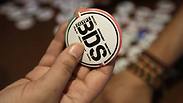
Six lies they told me about the anti-Israel boycott
Op-ed: A mixture of nationalistic and false statements about BDS campaign is blinding Israeli public and preventing a real discussion of the issue.
The bulk of recent incidents concerning the anti-Israel boycott, which are mainly symbolic for now, could have served as a warning sign. But a mixture of nationalistic and false statements is blinding the Israeli public and preventing a real discussion of the issue. Here are a few examples.
The boycott is a continuation of the Arab boycott against Israel: No, it's not. From the 1950s till the 1990s, the Arab League imposed an economic boycott that used the weapon of oil to force countries and international companies to sever ties with Israel. This time, the boycott is not being led by Arab states, or by one main organization.
This is a collection of elements around the world, most of which have nothing to do with each other, and their only common denominator is extremely harsh criticism against Israel, which is partially false and partially true, and the desire to take steps to force Israel to end the occupation.
The boycott is a unique phenomenon against Israel and because we are Jews, and is therefore anti-Semitic: No, it's not. Comparing the anti-Israel boycott to the international boycott imposed on the apartheid regime in South Africa in the 1980s will point to many similarities in terms of the participants, the sources, the wordings, the areas and the issues the boycott was imposed on, the audiences it developed from, etc. Were the students who launched mass protests on US and European campuses against the racial segregation and the regime in Pretoria also anti-Semites?
The boycott is mainly a Middle Eastern and European phenomenon. It will never reach the United States: That's not true. The sympathy towards Israel is greater in the United States than in Europe, but the situation is getting worse in the US as well. Members of Jewish organizations are reporting growing difficulties on campuses across America, where the boycott supporters' activity is increasing and being joined by more and more elements in the American media, which is usually perceived as pro-Israel.
The voices calling for a boycott are also increasing in other countries which are considered clear supporters of Israel (such as Canada and Australia). The fact that the prominent politicians and senior journalists in these countries are either Jewish or pro-Israel will not silence this unrest for long.
Terrorist elements/Palestinians/radical anti-Semites are behind the boycott: That's not true. Such elements can definitely be found within the hundreds of organizations and Facebook groups involved in the attempts to impose boycotts on Israel, but if it were up to them – the boycott would have been imposed a long time ago. And it's not that they haven't tried.
The boycott's power is in the foothold it is gaining among many audiences which have nothing to do whatsoever with the Middle Eastern conflict. From the moment the suicide bombers stopped exploding themselves on our cities' streets and the number of Israeli casualties dropped dramatically, the Israeli-Palestinian conflict seems like an unclear real estate dispute, which creates instability and looks like apartheid from afar.
Israel can defeat the boycott if the Foreign Ministry becomes more efficient and receives an increased budget: That's not true. The main problem in the fight against the boycott is not the marketing but the product. In the world of 2015, occupation would never be accepted. A more efficient implementation of the Israeli habara can only play for time – another apology from the Orange CEO, another delay in the FIFA sanctions. It cannot delay it forever. Using secret means and mobilizing resources for a focused activity are good against few rivals, not against hundreds of organizations and tens of thousands of activists.
"The campaign's goal is not only to influence a certain Israeli policy or another, but… to destroy Israel's existence as a Jewish and democratic state" (Justice Minister Ayelet Shaked): That may be true about some of the anti-Israel protestors, but it's not true about many others. We can argue with them, we can say that they are wrong or that they are lying. But from my acquaintanceship and meetings with some of the elements calling for a boycott, I am under the impression that these are people and organizations that are really convinced that Israel is becoming an apartheid state because of the occupation and that it is their duty to change it.
Someone may say, "How do you know? We are talking about sophisticated anti-Semites who conceal their real intentions." And how do they know? The argument that there is a plot to destroy Israel under the disguise of criticism against the occupation requires proof, and the burden of proof lies on the person making this argument. Moreover, if we are really talking about rooted European anti-Semitism, where has it been all these years until now? On the eve of the Six-Day War, mass protests were held in Europe in favor of Israel. Since the beginning of the occupation, the support for Israel has grown weaker until the boycott phenomenon we are witnessing these days.
The apartheid regime did not collapse because of the terror activities of the African National Congress (ANC), but because the government leaders saw the escape of their sons, who did not want to grow up in a leprous country, and realized that they had reached the end of the road.
The comparison made by the boycott supporters between Israel and the apartheid regime in South Africa is far from accurate, but the comparison to the world's attitude towards South Africa in the 1980s and towards Israel today is very accurate. We should look this truth in the eyes and realize that there is only one efficient way to deal with the boycott – real negotiations with the Palestinians.











